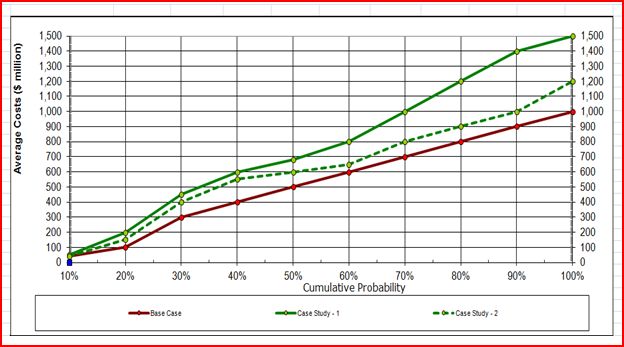[Solving Problem (Sensitivity
Analysis) from Skills and Knowledge of Cost Engineering, 5th Edition.
Chapter 31, PP31.1 – PP31.9].
1.
Problem recognition, definition and evaluation
What-if analysis is the substitution of variables
in a risk model to test the effects of changes in projects variability. What-if
analysis is also referred to as sensitivity analysis. The problem statement is
to determine the value with the lowest cost or greatest savings to be selected from
possible alternatives.
2.
Development of the feasible alternatives
3.
Development of the outcomes and cash flows for each Alternative
The simulation output curve indicates the project
would vary from $100 million with 10 percent probability to $1400 million with
90% probability.
1.
Selection of the acceptable criteria
What-if sensitivity approach proves successful in making the
design process fast-tracked, well structured and transparent. A
critical evaluation of the above analysis against its possible alternatives
unveils the decisive factors in the choice of acceptable alternative based on both qualitative and quantitative
assessments of projects variability. The value with the lowest cost or greatest
savings should be given the highest priority.
5.
Analysis and Comparison of the alternatives
The use of what-if (sensitivity analysis) as a risk
management technique and risk analysis allows projects to proceed on the basis
of both qualitative and quantitative assessments of projects variability.
6.
Selection of the preferred alternative
What-if approach
proves successful in making the design process fast-tracked, well structured
and transparent. A critical evaluation of the analysis against its possible
alternatives unveils that the decisive factor is the choice of adopting
Project-1 as the best modeling scenario rather than Project-2.
7.
Performance Monitoring and Post Evaluation of Results
As explained in the above what-if simulation, the
project cost can vary from $100 to $1400 million and between 10 and 90 percent
probability. If the business environment requires greater risk, then the
project budget that will be chosen will have a greater chance of variability. For
example, in cost terms, one can substitute various quantities and unit costs to
test the sensitivity of risk items to changes in projects variability. However,
concern would be raised if small changes result in large effects on the costs.
8.
References/Bibliography
1.
Hamilton, Allen C. CCE (2012). Risk Management - what-if analysis.
[ONLINE] Available at:
http://www.ebay.com/ctg/skills-and-knowledge-cost-engineering-product-education-board-aace-international-a-international-/1286202211.[Last
Accessed 18 December 12].
2.
Humphreys & Associates (2012). Introduction Discussion of workshop approach
Review of notebook ... Case Study 7: Path analysis using total float ...
What-If Analysis .... [ONLINE] Available at: http://www.humphreys-assoc.com/.../project-scheduling-workshop-a...[Last
Accessed 18 December 12].
3.
APA Format Citation Generator Website
Referencing:


Awesome case study, Austin!!! BUT, you need to spend more time with Engineering Economy and not just Skills and Knowledge.
ReplyDeleteSo what I'd really like to see you do is turn to pages 459-469 in your Engineering Economy and create a SPIDER GRAPH of this same case study.
And if you have access to any simulation software, what would be even better would be if you could take the same case study and create a TORNADO DIAGRAM.
Explained another way, there are three other "better" or "more common" tools and techniques to analyze Sensitivity- Spider Graphs, Radar Charts and Tornado Diagrams.
Good submittal for W9, but I'd highly recommend that you experiment with the other tools & techniques. (You will thank me when you sit for your CCC/E, CEP or DRMP exams!!)
To see a really great example of what I am looking for from you, visit this blog from our Indonesian class.
http://aacemahakam.blogspot.com/2012/12/w22tri-sensitivity-analysis-on-selected.html
BR,
Dr. PDG, Jakarta